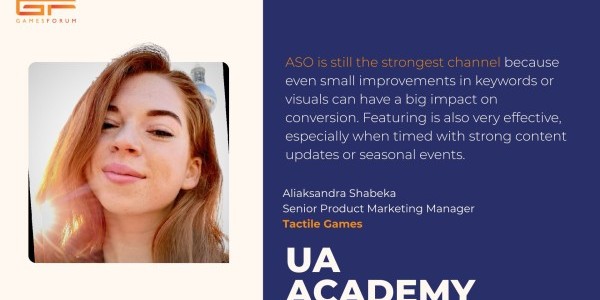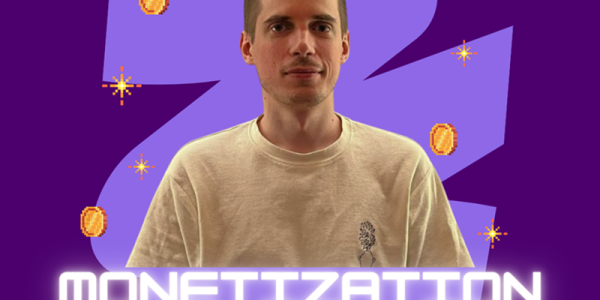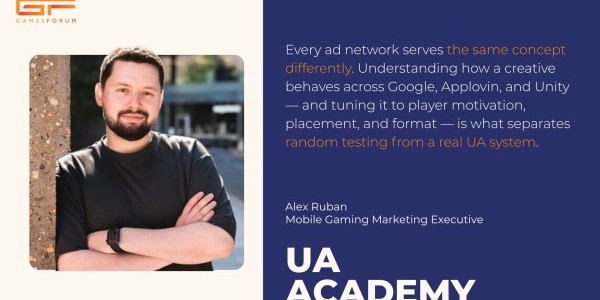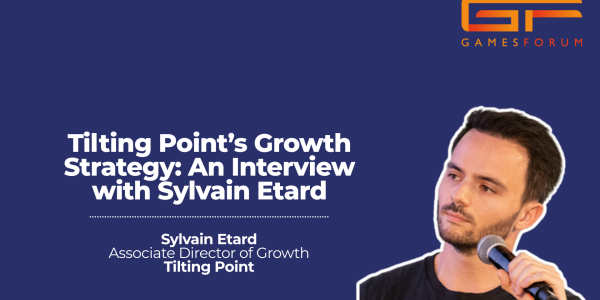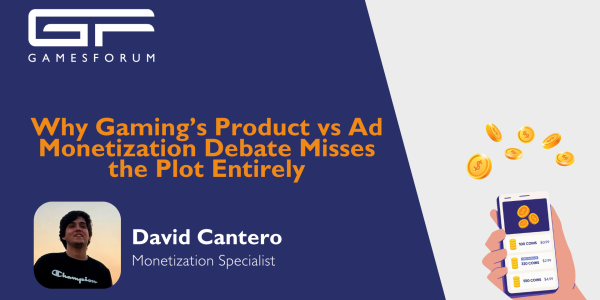Gamesforum Meets: Vladislav Ladizhenski, Head of Growth, Sunday

Josh Vowles: Hi Vlad. Can you tell us a bit about yourself?
Vladislav Ladizhenski: Hi, yes. As I said, I'm Vlad, I'm head of growth at Sunday. I've been in this industry now for roughly five years. I actually started as a marketing intern. My main task was uploading creatives and maintaining the campaigns. So I kinda like grew from the bottom and went through all the processes of marketing and monetization until I ended up here at Sunday.
Josh Vowles: As head of growth with Sunday, can you sum up your role for us?
Vladislav Ladizhenski: So, as the head of growth at Sunday, basically my responsibility is to take care of all the growth processes and all the monetization processes, which means optimising the revenue while also maximising the absolute margin, let's say it like this. So all the processes that involve monetization and user acquisition are handled by my team across departments.
Josh Vowles: Can you tell us a bit more about Sunday?
Vladislav Ladizhenski: Yeah, so we, at Sunday are a hyper casual games publisher based in Hamburg. We develop games in-house, but also published with external studios. Meanwhile, we have offices across the globe. We have one in Berlin, one in Hamburg, one in Munich, India and other countries. So we work internationally and try to crack this formula of what is the best hyper game and sustainably create those in the industry.
Josh Vowles: When you're not driving growth and monetization at Sunday what are your hobbies? What can people find you doing?
Vladislav Ladizhenski: My hobbies are, I'm trying eagerly to watch all the new and good movies and series. Especially when it comes to series, I would say requires some serious time management. So not to get lost across all of these new shoes that are coming out basically.
I am working in the gaming industry and of course the majority of people would say they're also gaming in private. So I'm doing some, I'm really competitive when it comes to online gaming in some cases here and there. But also to stay fit. We were lucky to get our own gym in the office, so also hitting the gym three times a week to start to stay fit while doing all this couch sports gaming and watching series.
Josh Vowles: Okay, I want to push you on this one! What is your favourite series and what's your favourite movie and game at the moment?
Vladislav Ladizhenski: What is my favourite series? It's hard to say. I, I would say it, it depends on the genre. I mean, they're the classical ones. Everyone will probably say like Game Throne and Breaking Bad and so, but one of my favourites, one of the old ones called Lost, I think that's the series which started the whole series hype at some point. When people were actually for the first time sitting on the couches each Friday and waiting for the new episode to come out. At least that is how it felt for me. And then this was kickstarted by it. So yeah, I would say Lost is one of my favourites.
Movie is super tough. I would say may maybe Interstellar is pretty impressive and when it comes to games it's really, as I said, I'm playing competitive games, so I would say all of the first persons shooter is currently what I'm playing. Like Overwatch 2, not the best game, but entertaining. Essentially any game that you can play with friends, actually. Like if you just need a group of friends and then you can enjoy the game, it doesn't matter if it's a good one or a bad one, you'll always have a good time and fun.
Josh Vowles: Lost is a controversial take! Bringing us back on track though, creative testing is ranked our number one challenge in our UA survey. How are the team at Sunday tackling testing and finding those winning creatives?
Vladislav Ladizhenski: The way we tackle creatives at Sunday is I would say professionally, because creatives are the main driver for hyper. It’s all about the creative performance when it comes to UA because the way we outperform our competition is by having those high APMs in the industry and that allow us on the other side to achieve high ECPMs by having lower CPIs because the people are interested in our product and actually want to install the game.
So what you need to do is basically remove the randomness so it's not this out of the blue sky idea which you use in this creative in the next week. You do completely something different, but you need a strategy and you need to follow it. So optimising your creatives in any kind of approach, like even the best ones are not, are currently maybe the best ones, but could still be better.
So ideally you have some kind of a metrics where you test certain things by like week by week you have already like a pipeline of creatives, which you're going to test, you evaluate the test results and then you keep improving even if you already found the best one out of this package. And what you need to do for that is basically a good structure and also a great team, which we are happy to have, which is able to deliver you the quantity that you need to do it basically on a weekly base. And also to the quality. Of course you can have a lot of those, but if they're not looking attractive for the audience, no one's going to install.
So they have to be high quality, there have to be a lot of them and you need to live with the fact that maybe 10% of the things that you're testing will be a success, maybe 5%. And the rest will fail. I mean that's also the situation for the whole hyper, it is representative for the whole hyper market.
Josh Vowles: Yeah, it's definitely about diversity it's a numbers game, right? It's trying to create as many in quality and in terms of the quantity as well. Hoping that some stick.
Vladislav Ladizhenski: Exactly. It is the qualitative things that you try to measure, like quantitative metrics. So you want to say, hey, this, the, the, the one with the black and the red background performed better when you use the red background in another one and it doesn't perform better.
Josh Vowles:I caught an article you did with Sunday a few months ago talking about the work you have been doing with automation. Can you tell us more about how you are harnessing automation to drive growth for Sunday?
Vladislav Ladizhenski: How do we tackle automation? So luckily in our industry, actually the majority of things we are doing is based on simple math. It's not magic. If you break it down, it's simple math. And the thing that is making it actually yeah, tougher or more challenging to automate is the fact that there are a lot of variables that are impacting your performance either on the UA side or monetization side, where you either have no influence or you just need the expertise to know what is the effect of those variables and how are they impacting other things and how are they interconnected with each other. So that means if you have the best growth manager, not a magician, although some of them try to sell themselves like this, they just actually know by experience how those variables are occurring, why they're occurring, how do they effect on the things that you are doing on a daily basis.
As we have the best people here in the industry, you know, that we hired them and they're working in our teams, we know we have this knowledge. And what you also need for automation is a lot of data. And again, luckily we are in the hyper casual industry, meaning we have a lot of data, we are reaching a lot of users and that's technically the best setup you can have to start feeding your models. And so we teamed up together with our BI team and tackled this issue, started to feed different models and soon started to see good results by certain machine learning algorithms.
I know to a lot of people machine learning sounds immediately fancy and there are a lot of companies who have no more than three functions saying like hey, that's machine learning but in this case actually is.
And we saw that this can of course, if we have enough data, if there's so much data, it just outperforms what a human can see or be aware of. So finding patterns, seeing like how was it evolving over a long period of time and which action should be taken.
So these are the things that we were able to automate and by doing so, we are enabling the people that are working for the growth team to actually re-empower them to have real impact on the company by having more of this macro view, thinking about what are the things we are currently doing, how can we do it better where are we missing opportunities? Because you cannot automate everything obviously. Like some things you just need to test to try, they've not been done yet, but you can automate is only things that are occurring periodically or daily. And where you hit know already, when you have some knowledge or data in the back. And that's what we did. And I think we are still improving it. I don't think that you can finalise something, as I said, you cannot automatize every step, but yeah, so far we are doing quite a good job's.
Josh Vowles: As you said, you can’t have automation in every single step, but you can free up the time of your growth managers to focus on the important stuff. The stuff that looks more to innovation.
Vladislav Ladizhenski: Exactly and I don't want to put words in peoples mouth, but I really think that growth managers did not join this industry to copy numbers from one sheet to another and change this five to a six, change this five to a seven, but they want to actually say, hey, how can we make the best out of this product?
Josh Vowles: My final question for you Vlad, one of our expert speakers at Gamesforum Hamburg what can we expect to hear from you?
Vladislav Ladizhenski: What can you expect to hear from me? I would say honest, transparent opinion, which is mostly based on data. So not just a simple opinion, but with a little bit of background always but also mixed in with humour and some jokes in between. That's definitely what you can expect.
And as a local you can also expect to get an insider information of where to, where to hang out after the meetings at the bar and where to find the best bar or a restaurant for the night. So approach me if you want to!
Josh Vowles: Awesome, I have to ask what is your top recommendation for a restaurant in Hamburg?
Vladislav Ladizhenski: Yeah, it's a tough question. I guess that's like asking what is your favourite restaurant in London? But, I would say the really nice places you can go in Hamburg is called LOKMAM. It's an outstanding Turkish restaurant. It is famous across all Hamburg, people actually going for like a short lunch will travel for half an hour in one direction!
When it comes to bars, there's just too many. I think people would tell you, there's Tipsy Baker, I think that's one outstanding place that you can definitely visit.


